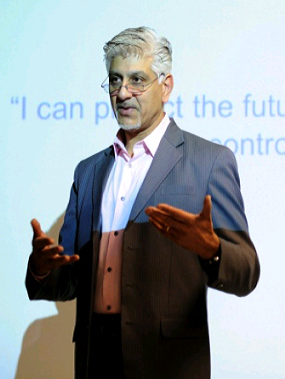Faculty Spotlight: The Close School's Zahed Subhan

A common stereotype about professors is that they’re out-of-touch academics, locked away in their ivory towers with no clue about what’s going on in the “real world.” Perhaps no one shared that stereotype with Zahed Subhan, PhD, a teaching professor at the Drexel University Charles D. Close School of Entrepreneurship. With a background in biotech and experience working for both established companies and startups around the world, no one would ever accuse Subhan of being out of touch with today’s business world.
With five degrees, including a PhD, an MBA and a JD, to his name, it shouldn’t come as a surprise that Subhan has spent much of his professional life as an overachiever. He’s spent 30 years working in multinational pharmaceutical and biotechnology industries as senior management and is a founder of three biotech companies, one of which went public on the NASDAQ exchange. Though his PhD is in pharmacology, Subhan quickly realized that his interests and strengths lay at the intersection of science and business, and he’s raised over 30 million dollars to fund startup enterprises in the life science, pharmaceutical and biotechnology sectors.
Subhan joined Drexel’s faculty in 2013, attracted by the mission of the Close School.
“What I saw in the Close School was an emphasis on growing the entrepreneurial mindset: a set of attitudes, skills and behaviors that all students need to succeed academically, personally or professionally,” Subhan said. “Most people associate entrepreneurship with ‘starting a business’ – that is true, of course, but the entrepreneurial mindset is not confined to startup companies. Every industry is focused on being more creative and more innovative, both of which are part and parcel of the ‘entrepreneurial mindset.’ In fact, in the largest survey of its kind, IBM interviewed 1500 corporate heads and public sector leaders across 60 nations and 33 industries. These leaders were asked what drives them in managing their companies in today’s world. Sixty percent of CEO’s cited creativity as the most important leadership quality and innovation as a ‘crucial capability.”
Although the concept of teaching entrepreneurship is relatively new, it’s a skill set that’s becoming increasingly important to students of many different backgrounds, not just business. Out of a recent class of 30 students, Subhan counted 20 from disciplines found outside of the Close School. This diversity doesn’t surprise Subhan, who believes that an “entrepreneurial mindset” is necessary for all students, as it describes someone who is innovative, resourceful and creates value.
“The mindset is important, the skills are important no matter what you do in your life,” Subhan explained. “I think that is the ethos that the Close School embraces. And I saw that as being very different from the majority of schools.”
So what does Subhan think his greatest teaching asset is?
“Business moves at lightning speed these days (it has to) and it is important that those of us who teach it are at the cutting edge, otherwise where is the value add to students?” said Subhan. “At the Close School, all professors and instructors ooze business and entrepreneurial experience."
In addition to his work at Drexel, Subhan has found the time to be a co-founder of two biopharmaceutical companies since 2013, both with modest goals: Eppin Pharma Inc., which aims to develop the first male contraceptive pill, and AestasRx Inc., which is focused on the early diagnosis and treatment of Alzheimer’s disease – an area where no company has yet to achieve any real success.
“I like to dream big and I encourage my students to do the same…in all aspects of their lives, but oftentimes you have to start small: take the initiative, be self-directed, take risks, be flexible and adaptable, be creative and innovative.” Subhan said. “We can all do that!”
